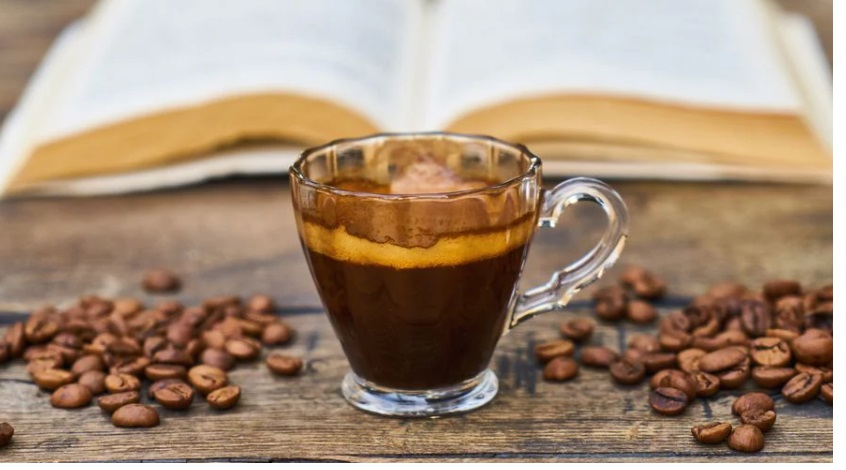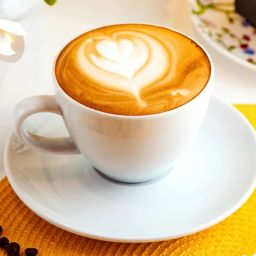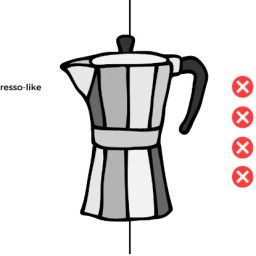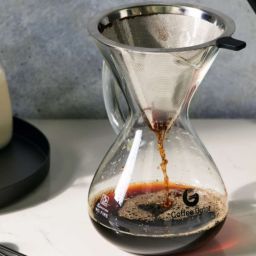
Caffeine is a natural stimulant most commonly found in tea, coffee, and cacao plants. It wakes up your brain, making you feel more alert and less tired. Hence, it’s a coveted morning favorite in the daily routine of millions worldwide. While many assume that a dark roast coffee would pack more caffeine because of its robust flavor and darker color, the reality is quite the opposite. The truth about dark roast coffee is that it often contains slightly less caffeine than its lighter counterparts.
How Much Caffeine is in a Cup of Dark Roast Coffee?
When it comes to measuring the pep you get from your cup, not all coffee is created equal. A typical 8-ounce cup of dark roast coffee holds about 130 to 140 milligrams of caffeine. This figure is actually a tad lower than what you’d find in light or medium roast coffees. The reason lies in the roasting process.
As coffee beans are roasted longer to achieve a darker roast, they lose some mass including caffeine density, which slightly reduces the amount of caffeine per bean. Thus, if you’re measuring your coffee by scoop rather than by weight, you might end up with less caffeine in your cup when you choose a dark roast.
Key Takeaways
- Caffeine content varies slightly across different brands and brewing methods. Each brand has its own roasting profile and methods, which can alter the caffeine levels in the coffee produced.
- Dark roast coffee might contain less caffeine than lighter roasts by volume. This is due to the extended roasting process, which slightly reduces the caffeine concentration in the beans.
- Factors like bean type and roasting duration impact caffeine levels. The type of coffee bean (Arabica vs. Robusta) and the length of time beans are roasted play crucial roles in determining the caffeine content of your coffee.
Factors Affecting Caffeine Levels in Dark Roast Coffee
The caffeine content in your morning cup of dark roast can be influenced by several key factors:
Bean Type: Arabica and Robusta beans differ significantly in their caffeine content. Robusta beans typically have almost double the caffeine of Arabica beans. So, the type of bean not only affects the flavor and aroma but also the caffeine punch your coffee provides.
Roasting Time: The longer coffee beans are roasted, the more they lose moisture and mass. Dark roasting leads to a reduction in each bean’s caffeine by volume because the beans expand and become less dense. This means you might be getting less caffeine per scoop of dark roast compared to a scoop of lighter roast, even though the caffeine by weight might be similar.
Brewing Methods: How you make your coffee also affects caffeine extraction. Methods like espresso and French press, which use fine grinds and high pressure or extended contact with water, typically extract more caffeine. In contrast, a standard drip coffee maker might not extract as much caffeine per ounce, but can still deliver a strong cup depending on how much coffee you use.
Brewing Methods and Their Impact on Caffeine Extraction
When it comes to caffeine extraction, not all brewing methods are created equal. Each technique can alter the amount of caffeine in your cup of dark roast coffee.
- French Press: This method involves steeping coffee grounds in boiling water for several minutes, which allows for a thorough extraction of caffeine. A French press can yield a robust cup with a high level of caffeine because the water remains in contact with the coffee grounds for longer.
- Espresso: Known for its quick brewing time, espresso uses high pressure to force hot water through finely-ground coffee. This process extracts a concentrated shot of coffee with a significant amount of caffeine in a small volume. Despite the short brewing time, the pressure ensures a high level of caffeine extraction.
- Drip Coffee: The most common household brewing method involves water dripping through coffee grounds, extracting caffeine as it passes through the filter. Drip coffee generally produces a moderate caffeine level, which can vary depending on how much coffee you use and the machine’s extraction efficiency.
Health Implications of Caffeine Consumption
Caffeine, a stimulant to the central nervous system, can have both positive and negative effects on your health.
Benefits: Caffeine can increase alertness, improve mood, and enhance cognitive function. It is often consumed to help wake up and stay focused. For athletes, caffeine can improve physical performance by increasing the efficiency of energy production and decreasing the perception of effort.
Downsides: Despite its benefits, caffeine can also disrupt sleep patterns and lead to insomnia, especially when consumed in large amounts or late in the day. It can also cause jitteriness, anxiety, and heart palpitations in some individuals. Over time, regular consumption of high caffeine levels can lead to dependence, with withdrawal symptoms including headaches, irritability, and lethargy when caffeine intake is reduced.
FAQs
Does the type of coffee bean affect caffeine content?
Absolutely! The type of bean is a major factor in determining caffeine levels. Generally, Robusta beans contain almost twice as much caffeine as Arabica beans. So, if you’re looking for a stronger caffeine kick, Robusta might be the way to go, while Arabica offers a smoother taste with less caffeine.
How does the brewing method influence caffeine levels?
The way you brew your coffee significantly affects its caffeine content. Methods like espresso, which use high pressure to extract coffee quickly, tend to produce a drink with more caffeine per ounce, while methods like the French press, which steep coffee grounds in hot water for a longer period, extract more caffeine overall but in a larger volume of liquid. Drip coffee falls somewhere in between, providing a balanced caffeine level.
Can decaffeinated dark roast coffee still contain caffeine?
Yes, it can. While decaffeinated coffee is significantly lower in caffeine than its regular counterpart, it is not completely caffeine-free. Most decaf coffees still contain small amounts of caffeine, so if you’re sensitive to caffeine, you might still notice its effects even from decaf.
Final Thoughts
From the type of beans used to the method of brewing, each aspect plays a role. Whether you prefer a robust Robusta or a smooth Arabica, understanding these elements can help you tailor your coffee experience to match your caffeine needs and flavor preferences.









